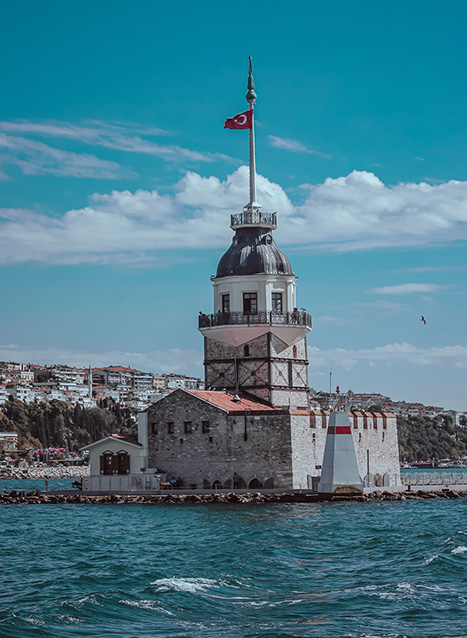Evacuations from Israel and High-Risk Locations Call +44 (0)1202 308810 or Contact Us →
Alert Plus: Istanbul Explosion

Situation Summary
On 13 November, at around 16:20 local time, an explosion occurred on Istiklal Caddesi in Istanbul. The street is mostly pedestrianised and is frequented by large numbers of both residents and tourists.
Available footage from the attack indicates that an explosive device was placed in a bag and then left on a bench in proximity to a Mango clothing store. Authorities believe the bag was left by a female suspect, who sat on the bench for around 40 minutes before walking away immediately prior to the explosion. Local authorities have also suggested that a nail bomb was used in the attack, which was designed to inflict mass-casualties.
As of 14 November, six deaths have been confirmed with a further 81 injured in the attack. Of those injured, 50 have been discharged from hospital, whilst the remainder are still being treated. Although Istiklal Caddesi has now reopened, having been closed in the immediate aftermath of the attack, there is an extensive police and security force presence in the area.
Turkish authorities announced on 14 November that a Syrian female suspect and a further 46 other individuals had been arrested following security raids at 21 different locations. Authorities have announced their belief that the perpetrator was a Syrian national, Ahlam Albahsir, who was trained as an intelligence officer by the Kurdistan Workers Party (PKK) and the People Defence Units (YPG). Despite this announcement, the PKK’s military umbrella organization, the People’s Defense Center (HSM) has denied being involved in this attack. Syria’s Kurdish-led and US- backed Syrian Democratic Forces (SDF) have also denied involvement.
Whilst no group has claimed responsibility for the attack, Turkish Interior Minister Suleyman Soylu claims that the attack was planned in Ayn al-Arab, a Kurdish- majority city in northern Syria. Soylu also stated that the attack was planned by the PKK/YPG, without offering evidence to support his claims. Despite the suspect’s alleged links to the PKK, Turkish officials have not ruled out an attack by the Islamic State (IS).
Solace Global Comment
The PKK is classed as a terror group by Turkey, the United States, the European Union, and since 1984 has been engaged in conflict with the Turkish State. Between 2015 and 2017, Turkey witnessed a string of attacks perpetrated by various Kurdish militia groups and IS. The attack on 13 November was the most recent terrorist incident in Istanbul since the January 2017 attack at the Reina nightclub in Ortakoy, which killed 39 people and was claimed by IS.
Istiklal street has also been attacked previously, with a suicide bombing in March 2016 killing five and wounding a further 36. In that instance, authorities initially blamed the PKK for the attack although subsequently confirmed that IS had been responsible.
The accusation by the Turkish authorities that the attack was planned by the PKK/YPG in northern Syria will very likely provide the justification for Turkey to launch a new cross-border operation into northern Syria. Since 2016, Turkish armed forces have been involved in northern Syria, targeting PKK/YPG forces. In May 2022 it was announced that Turkey’s planned fifth offensive in the region had been postponed, with some sources indicating this was due to pressure from other NATO allies. It therefore remains likely that Turkish authorities will seek to leverage anti-Kurdish sentiment in order to conduct limited offensive operations across the Syrian border in the short term.
In June 2023 Turkey will also hold general elections, which will include the election of the President of Turkey and elections to the country’s Grand National Assembly. Previous terror attacks between 2015 and 2017 are widely credited to have brought security issues to the forefront for the elections of 2018. It is highly likely that this attack will result in an increased focus on security in domestic political narratives in the short to medium term.
In the immediate short term, Istanbul and other major Turkish cities are likely to see an increase in the visible presence of police and security officials. Taksim square and Gezi park are the primary locations in Istanbul for civil unrest, protests and demonstrations, with an elevated security force posture in these areas very likely to remain advantageous to the Turkish authorities in the build up to the general elections next year.

Solace Global Advice
- In the event of a terrorist attack those in the area are reminded to RUN – HIDE – TELL – FIGHT
- Turkey has a notable risk of terrorism. Further attacks remain realistically possible, although the presence of additional security force personnel will likely mitigate the risk in the immediate term
- Individuals with planned travel to Istanbul are advised to reconfirm itineraries and expect localised travel disruption, particularly in the immediate vicinity of the incident
- Travellers are advised to avoid Istiklal Caddesi as emergency services remain on the scene to conduct their investigations
- Further terror attacks in Istanbul are likely to be indiscriminate, targeting crowded areas, government or security force installations and personnel, civilians, transportation networks such as metro stations and ferry terminals, and other high-profile locations including sporting infrastructure
- Locations where large groups of residents or tourists are known to gather are at higher risk of attack. You should be particularly vigilant in these areas and follow any specific advice or guidance from the local authorities or security personnel
- Exercise increased caution, remain vigilant, be aware of your surroundings and report any suspicious activity or items to security personnel as soon as possible
- If caught in the vicinity of a security incident, seek immediate hard cover from any incoming gunfire or explosions and leave the area if safe to do so. Continue to adhere to all instructions issued by authorities and obey any security cordons in place
- Monitor the Solace Secure platform and trusted local media for updates